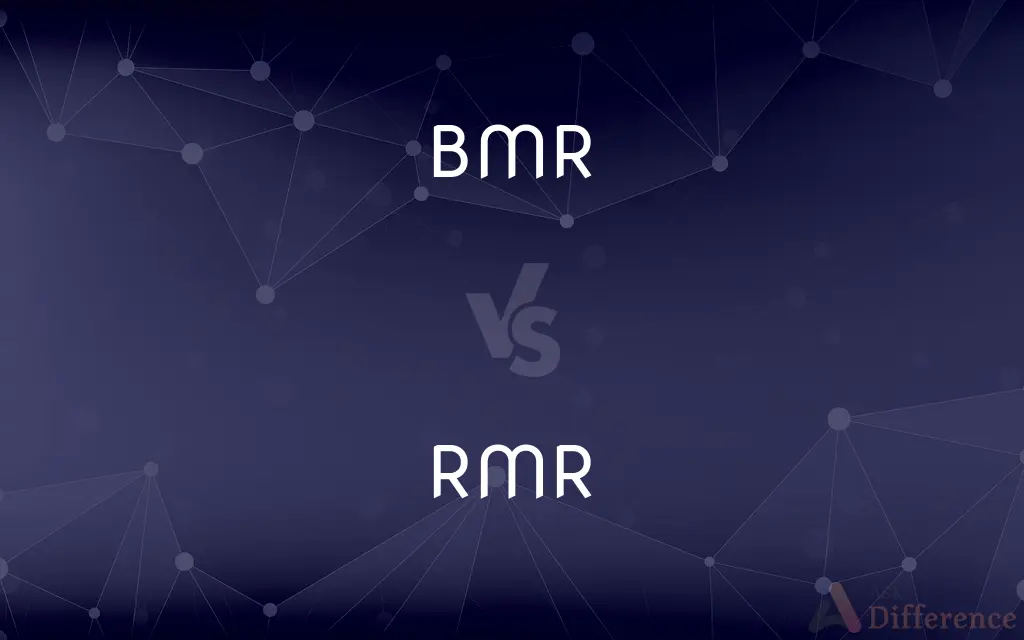BMR vs. RMR — What's the Difference?
By Tayyaba Rehman — Published on November 10, 2023
BMR (Basal Metabolic Rate) estimates energy expenditure at rest post-sleep, while RMR (Resting Metabolic Rate) gauges it under less controlled conditions.

Difference Between BMR and RMR
Table of Contents
ADVERTISEMENT
Key Differences
BMR, or Basal Metabolic Rate, and RMR, or Resting Metabolic Rate, are terms often used in the domain of metabolism and energy expenditure, yet embody unique subtleties. BMR constitutes a measurement of the amount of energy expended while at complete rest, typically post a peaceful night of sleep and after 12 hours of fasting, embodying a highly specific and controlled metric. Conversely, RMR, while similarly measuring energy expenditure at rest, is more commonly used due to its less stringent testing conditions, not necessitating specific sleep and fasting states and thereby reflecting a more readily obtainable measurement.
BMR typically requires a controlled environment to establish the absolute minimum amount of energy needed to maintain vital functions, such as breathing and maintaining body temperature, when the body is at complete rest. In contrast, RMR, while also a measure of the calories burned during a period of inactivity, does not entail strict conditions and is hence considered a more practical, albeit slightly less precise, measure for everyday contexts. It provides a more feasible metric for the general population and is often utilized in various health and fitness assessments.
While BMR demands a highly controlled setting, incorporating factors like a specific room temperature and particular physiological states, ensuring accuracy and specificity in its measurements, RMR is considered more user-friendly and applicable for general uses due to its relative simplicity in measurement. BMR’s precise nature often relegates its use to more clinical or scientific environments where meticulous control can be established. Alternatively, RMR is often employed in fitness and health industries, providing a readily accessible understanding of an individual’s resting energy expenditure without the necessity for stringent controls.
In essence, BMR is often viewed as a more "lab-based" measure, due to its meticulous control requirements, providing detailed and specific data pertaining to an individual’s energy expenditure in a state of absolute rest. Whereas RMR, often employed within fitness assessments and diet planning, allows professionals to gauge an individual's energy needs in a resting state without the requirement for extensive controls, fasting, or specific testing environments, facilitating a broader and more flexible application.
BMR and RMR, while similar, cater to different requirements within the health and fitness sector, providing insights into how our bodies utilize energy during periods of rest, yet differ significantly in their application, precision, and measurement conditions. BMR offers a meticulous and specific metric, while RMR offers an accessible and generally applicable insight into an individual’s metabolic rate during rest, each playing pivotal roles in various aspects of health, fitness, and scientific research.
ADVERTISEMENT
Comparison Chart
Definition
Minimum energy to maintain vital functions at absolute rest
Energy used at rest with no stringent controls
Testing Conditions
Strict, post-sleep and 12-hour fast
Less stringent, no specific sleep or fast
Measurement Precision
High due to controlled variables
Slightly less precise due to variable factors
Common Usage
More scientific and clinical settings
Health and fitness industries
Flexibility
Limited due to stringent testing conditions
High, easily measured in various settings
Compare with Definitions
BMR
Controlled Conditions
Calculations of BMR are conducted under strictly controlled physiological conditions.
RMR
Practical Use
RMR is commonly utilized in fitness assessments for its practicality.
BMR
Minimal Energy
BMR determines the minimum energy required to maintain crucial body functions at rest.
RMR
General Resting Metabolism
RMR provides a general estimate of energy expenditure during rest.
BMR
Post-sleep State
BMR measurements typically occur post-sleep to ensure absolute rest.
RMR
No Specific Rest
RMR estimates are valid without specifying the nature of rest.
BMR
Vital Function Sustenance
BMR quantifies energy needed to sustain vital functions without physical activity.
RMR
Variable Conditions
Unlike BMR, RMR doesn’t require strict testing conditions.
BMR
Metabolic Baseline
BMR offers a baseline from which metabolic rate under various activities can be compared.
RMR
Flexible Measurement
RMR allows flexibility, measuring resting energy needs in varied settings.
BMR
The rate at which heat is produced by an individual in a resting state
Common Curiosities
Is BMR always measured after sleep?
Yes, BMR measurements traditionally occur after sleep to ensure the body is at complete rest.
Can RMR be measured without fasting?
Yes, RMR does not require a fasting state for measurement and is thus more flexible.
How accurate is RMR in comparison to BMR?
RMR is generally less precise than BMR due to its less stringent testing conditions.
Why is BMR measured in controlled environments?
BMR is measured under controlled conditions to accurately determine the minimum energy needed for vital functions at rest.
Can RMR be used for diet planning?
Yes, RMR is often utilized in diet planning and fitness assessments due to its practicality.
Does BMR consider physical activity?
No, BMR only considers the energy expenditure necessary to maintain vital functions at complete rest.
Is a higher BMR indicative of a faster metabolism?
Generally, yes—a higher BMR usually indicates a faster metabolism, meaning the body uses more energy at rest.
Does BMR change with age?
Yes, BMR tends to decrease with age due to factors like muscle loss and changes in body composition.
Is BMR relevant for fitness assessments?
While BMR provides valuable metabolic information, its stringent testing conditions often make RMR more relevant for general fitness assessments.
Can RMR be used in clinical research?
Yes, though RMR is less precise than BMR, it can be used in clinical research, particularly in studies requiring less stringent conditions.
What instruments are used to measure RMR?
RMR is commonly measured using indirect calorimetry, which estimates energy expenditure by measuring respiratory gases.
Can diet affect RMR?
Yes, dietary changes, particularly those affecting muscle mass or overall body composition, can impact RMR.
Is BMR applicable for creating diet plans?
BMR can be used in creating diet plans but is often supplanted by RMR due to its practicality and ease of measurement.
Can both BMR and RMR be utilized in a complementary manner?
Yes, while BMR provides detailed metabolic information under strict conditions, RMR provides more practical, everyday metabolic measurements, each offering unique insights.
Share Your Discovery

Previous Comparison
Joint Venture vs. Partnership
Next Comparison
Policies vs. ProceduresAuthor Spotlight
Written by
Tayyaba RehmanTayyaba Rehman is a distinguished writer, currently serving as a primary contributor to askdifference.com. As a researcher in semantics and etymology, Tayyaba's passion for the complexity of languages and their distinctions has found a perfect home on the platform. Tayyaba delves into the intricacies of language, distinguishing between commonly confused words and phrases, thereby providing clarity for readers worldwide.












































